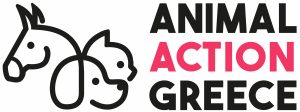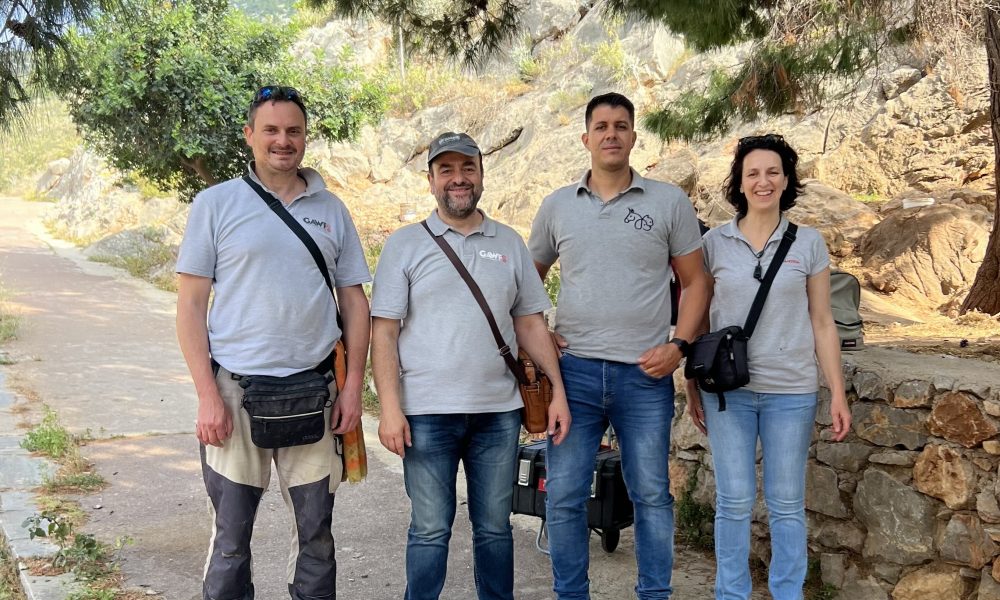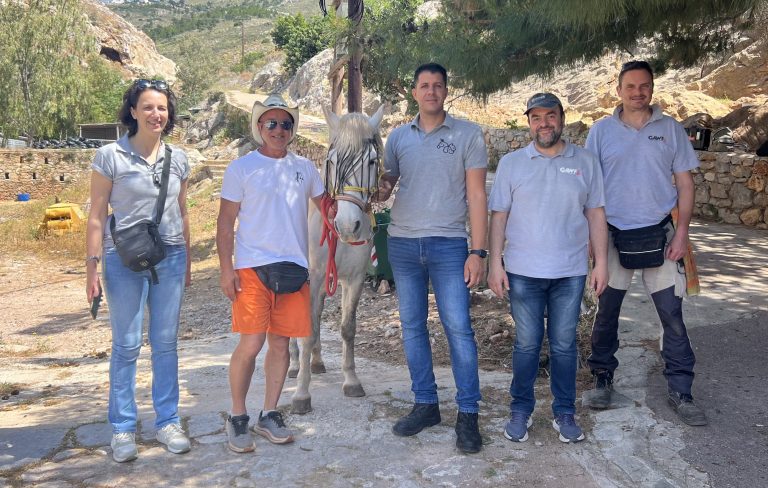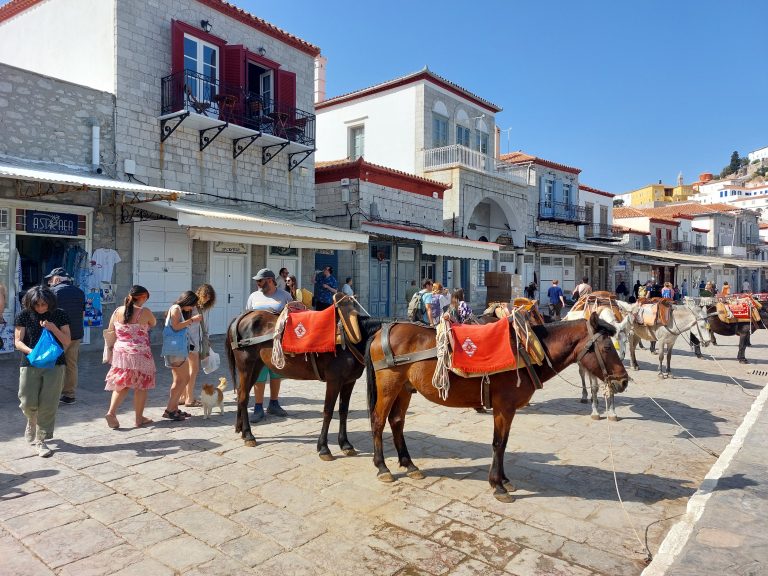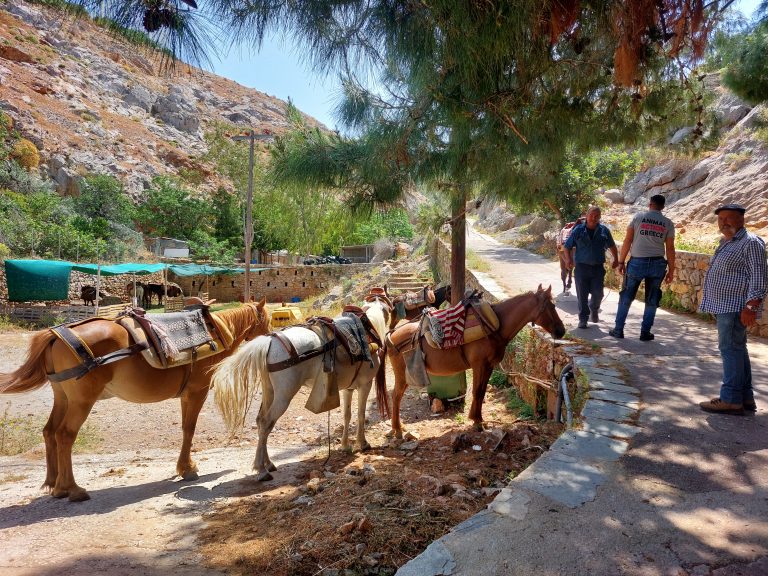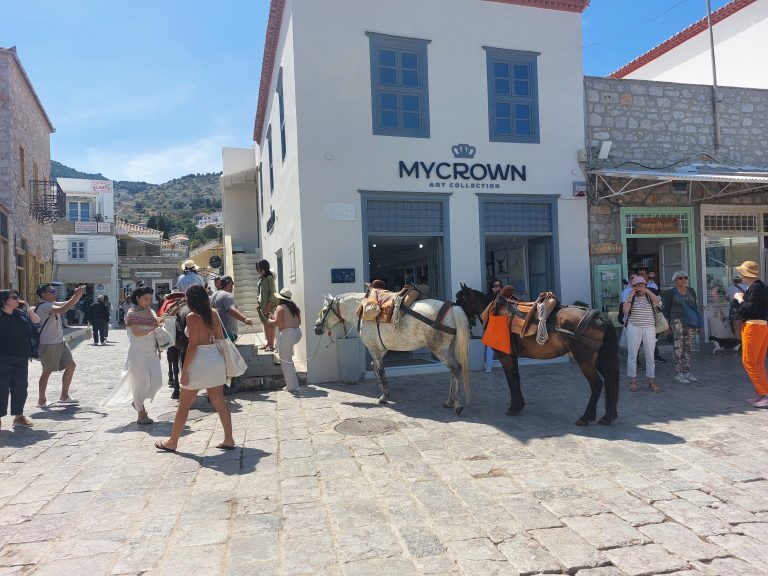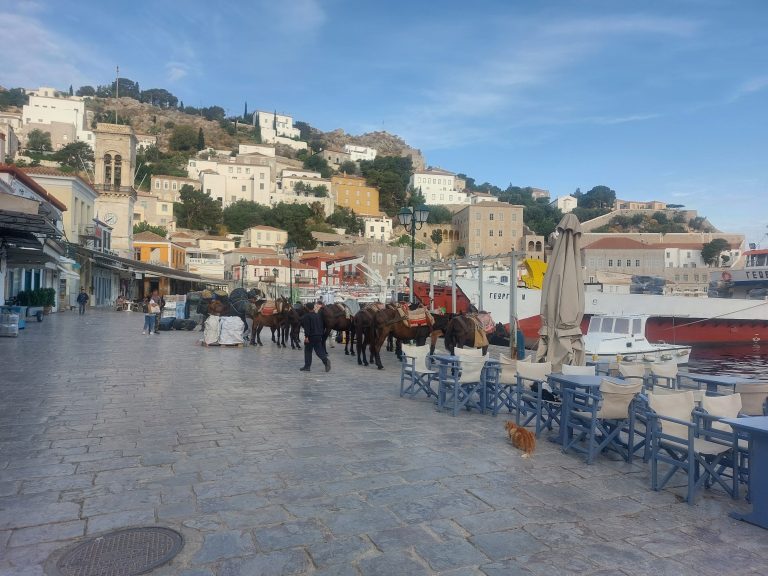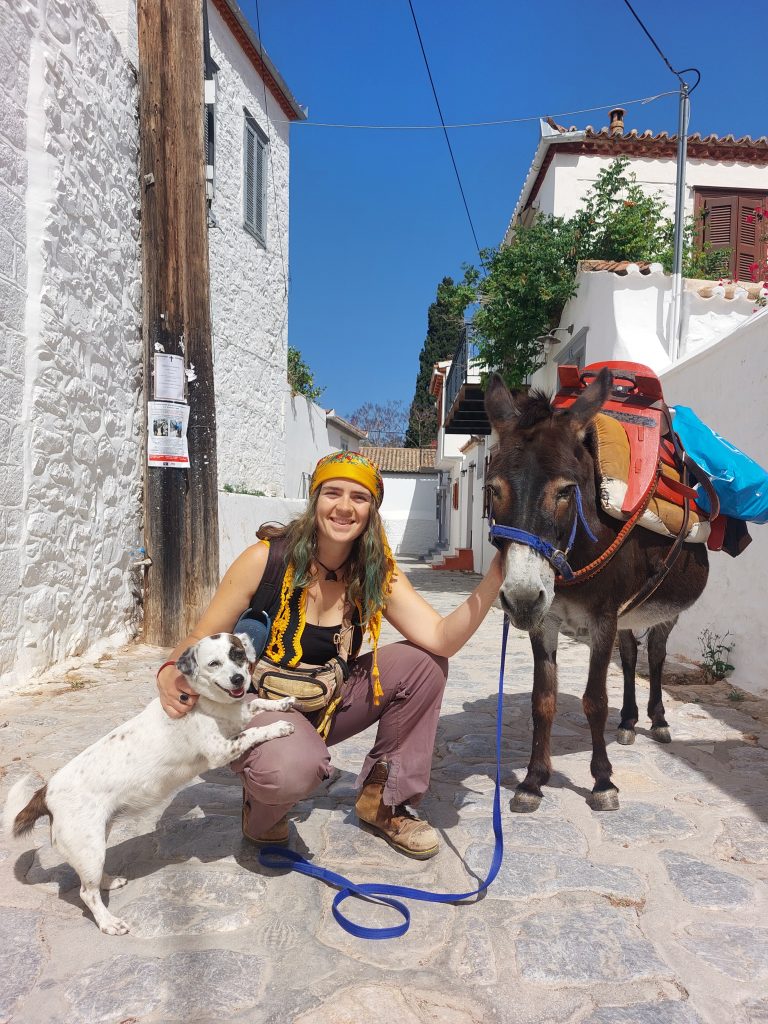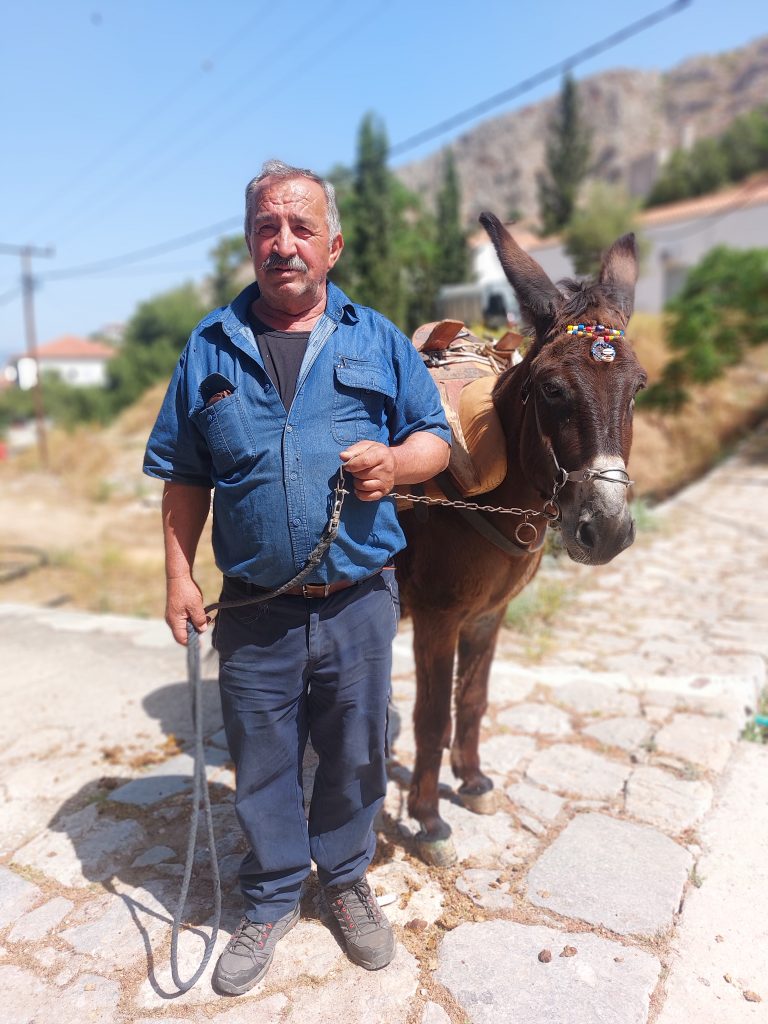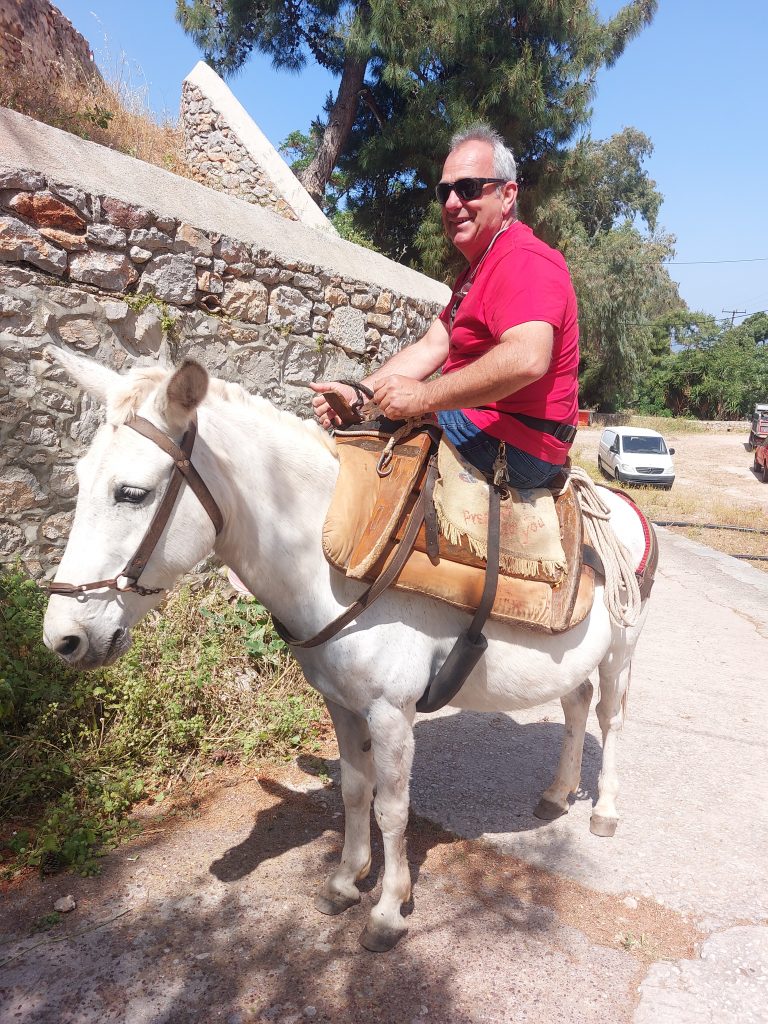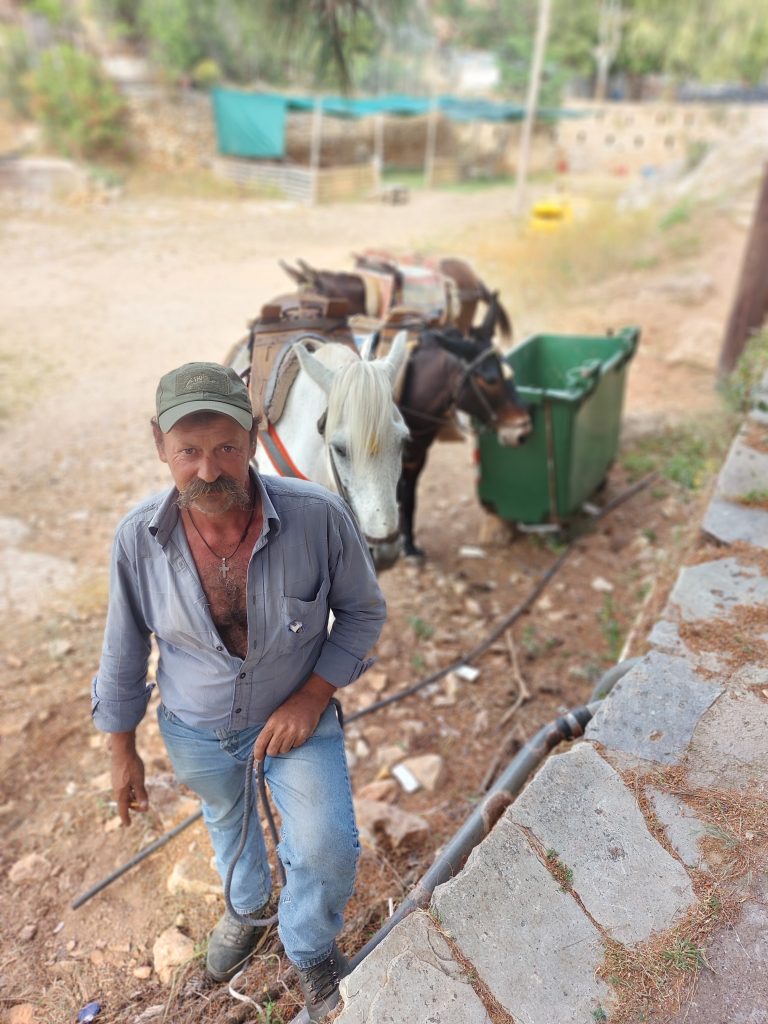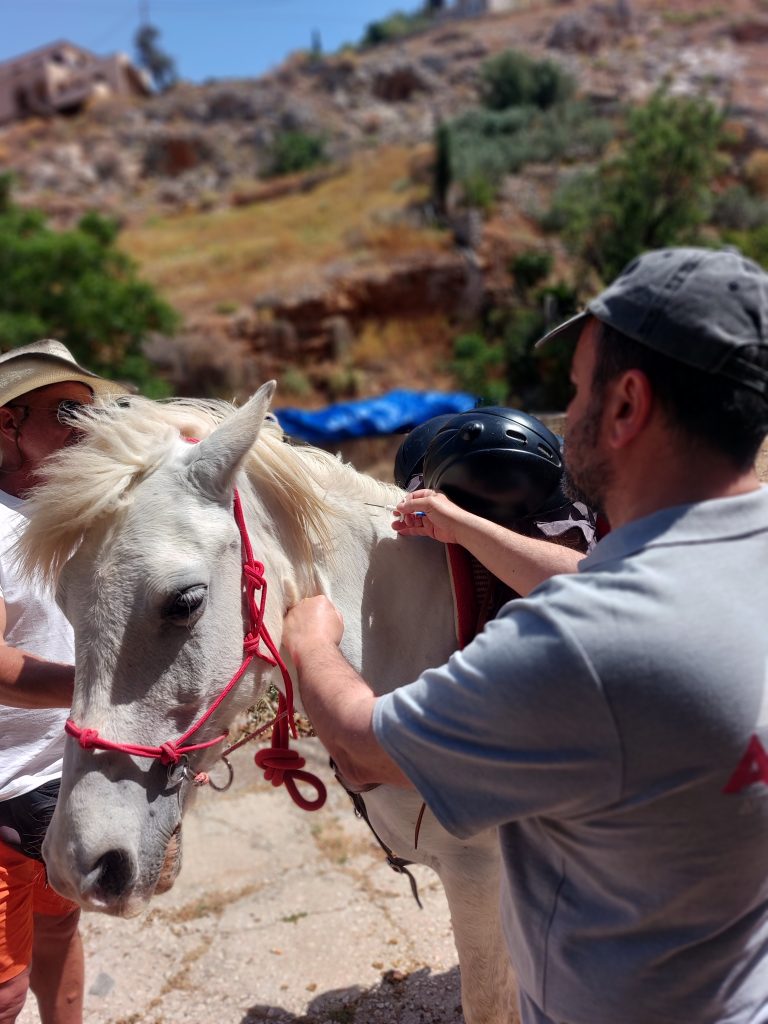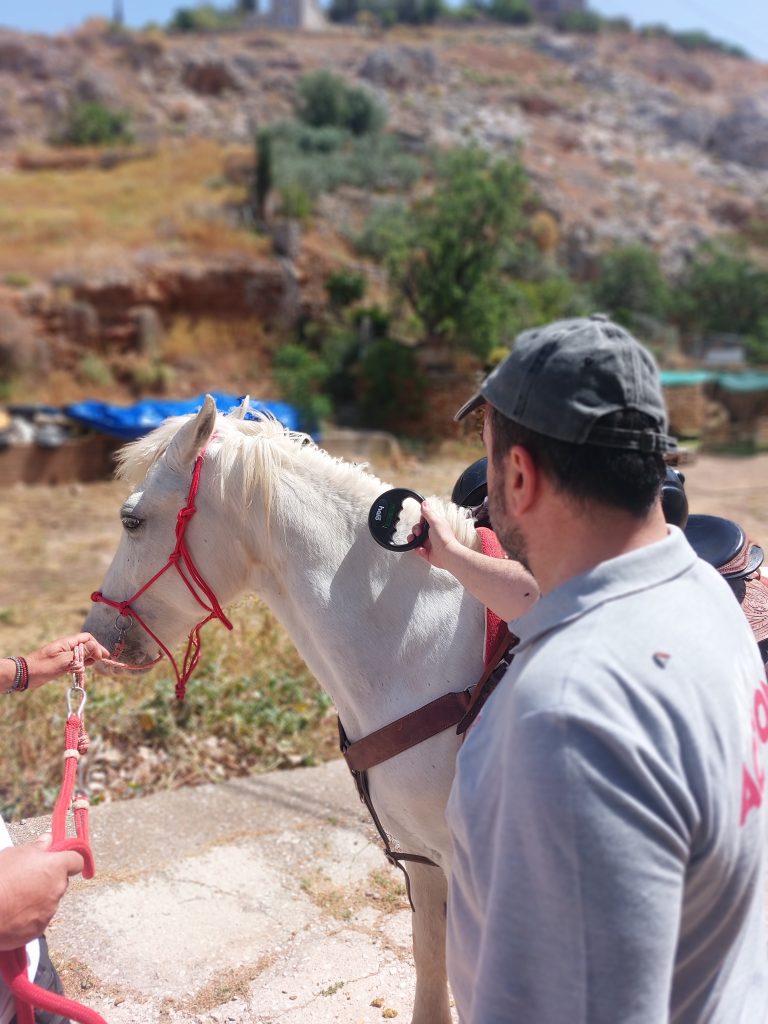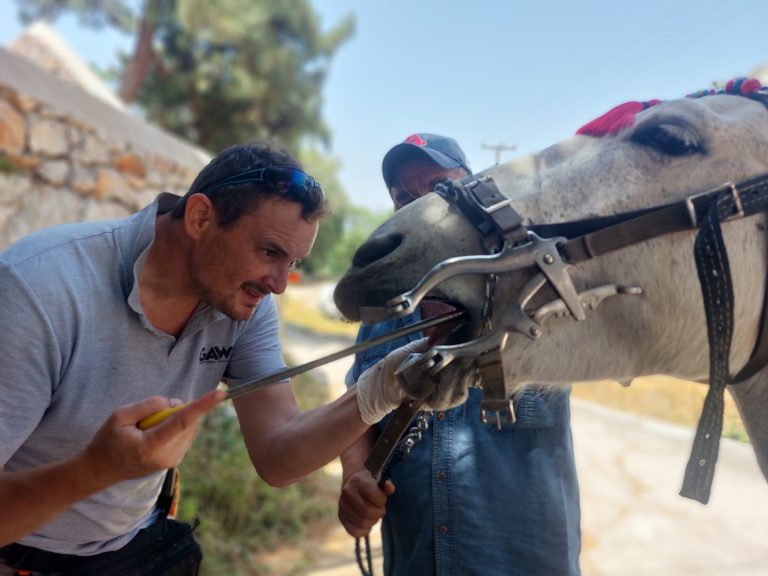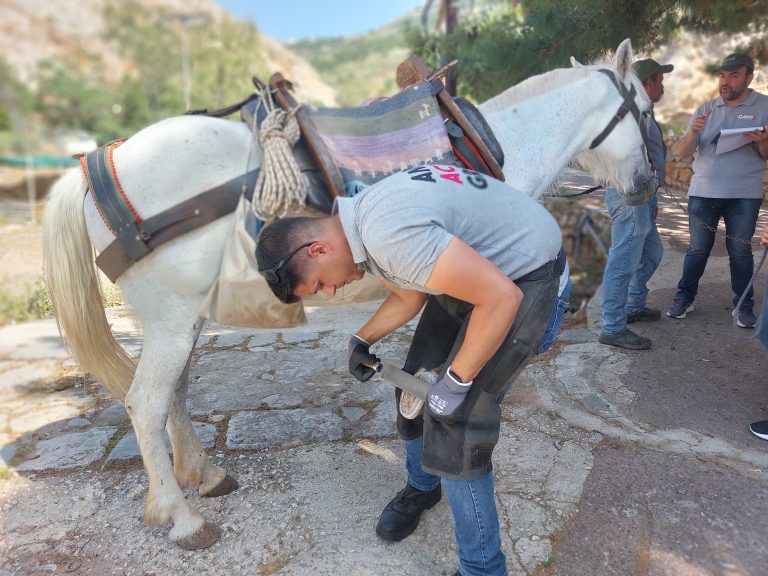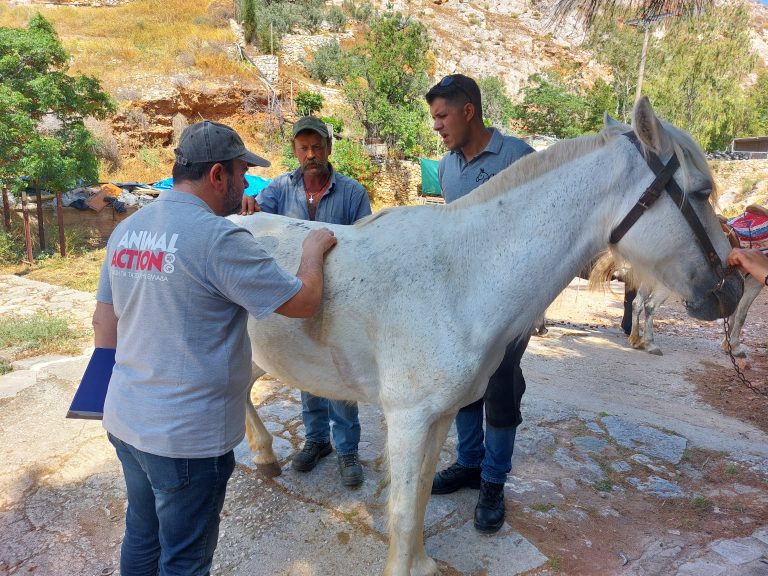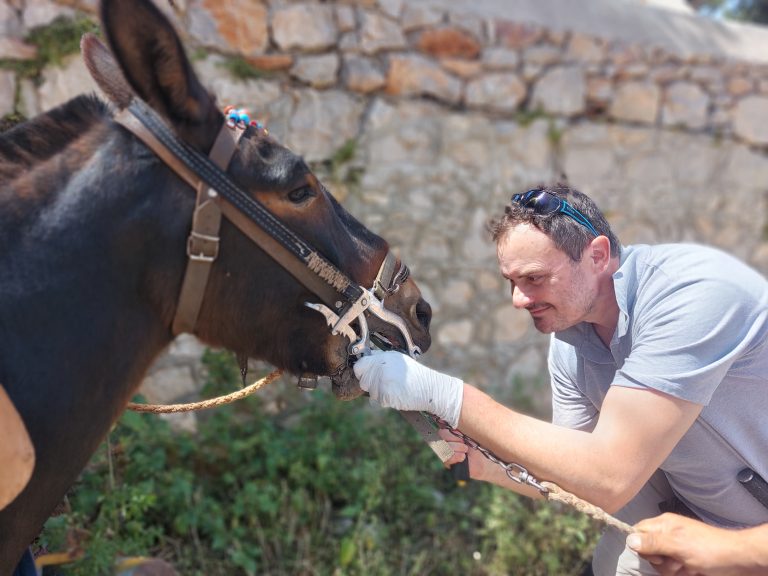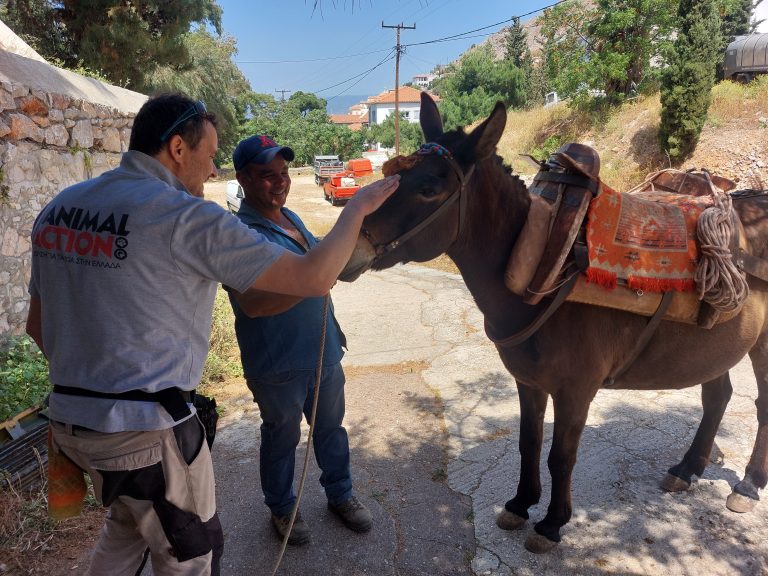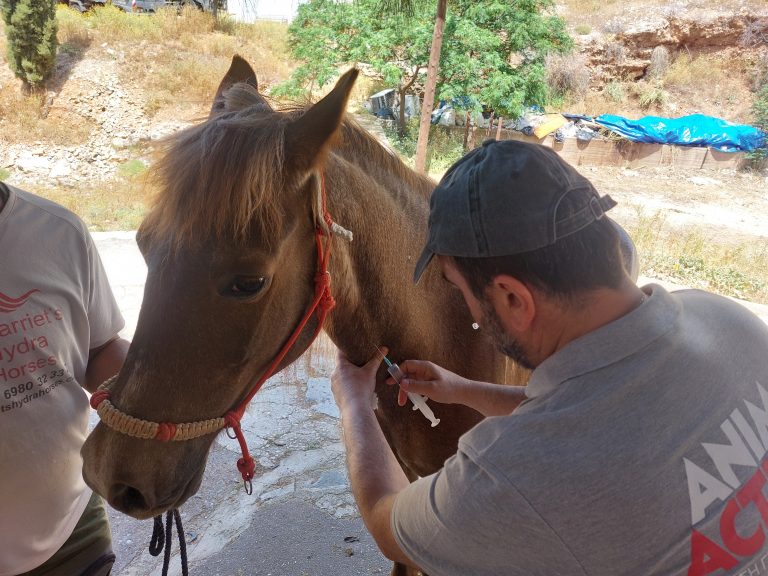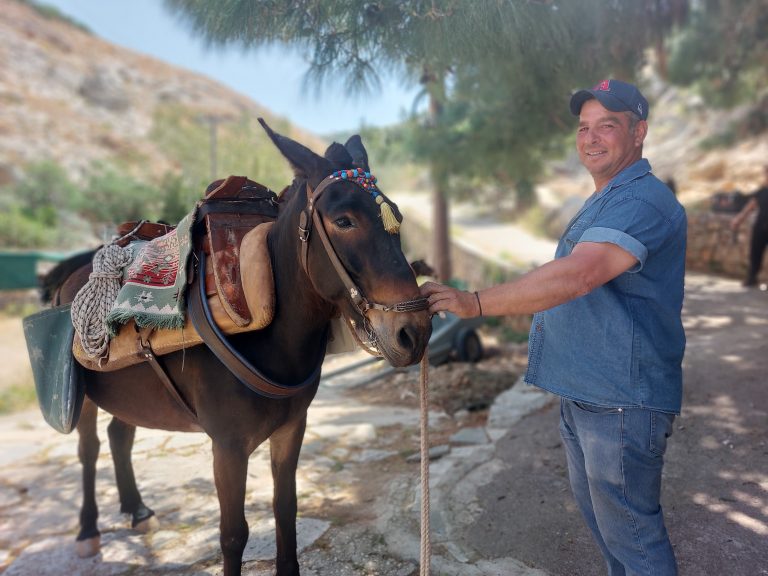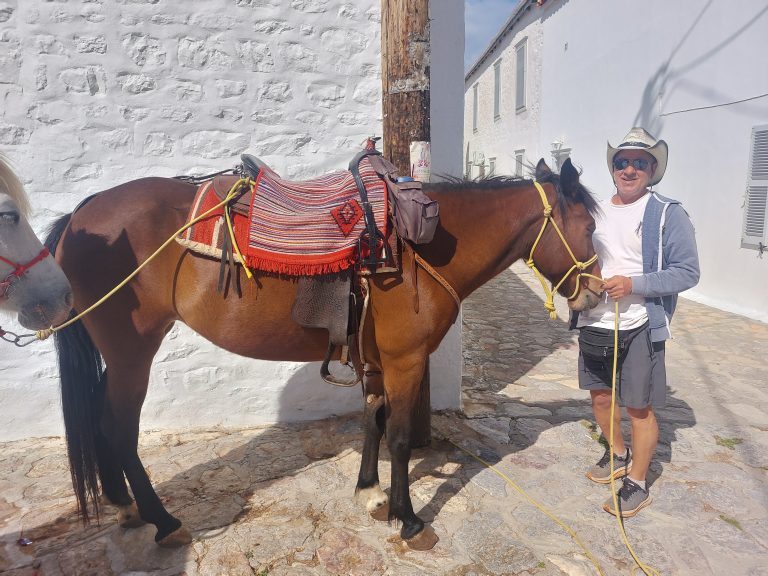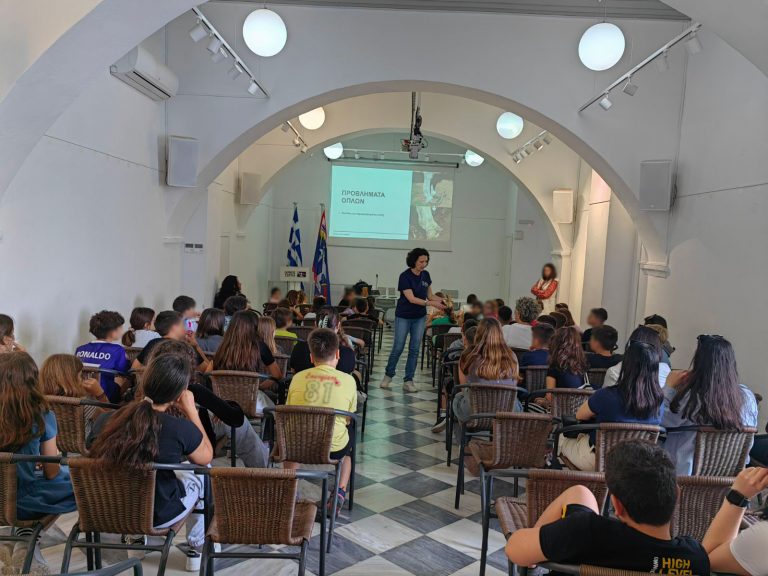The equine outreach team conducted its annual visit to the island of Hydra on the 9th-10th May.
Veterinarian Kostas Okkas, dental technician Alkis Gkeskos and farrier Vaios Bakratsas offered their services to 41 equines (23 horses, 15 mules and 3 donkeys).
In Hydra no travel between locations is required. As always the team operated from its usual base, in Gefyria, where equine owners brought their animals for examinations and treatment.
On the serene Hydra island in Greece, vehicles are strictly forbidden, preserving its rustic charm and tranquil ambiance. Here, equines reign supreme.
Due to the lack of vehicles, the majority of equines on the island serve as the primary mode of transport, carrying all kinds of materials along the narrow, cobblestone streets. Many are used for leisure riding and transporting tourists to various destinations across the mountainous part of the island. This dual-purpose use — both for helping in everyday tasks and for the tourism — emphasizes the need for responsible ownership and the importance of regular veterinary care.
Equine owners
A significant portion of owners believe they have sufficient animal care knowledge based on lifelong experience. However, this practical experience is often limited and not supported by modern veterinary practices. These owners may present as abrupt, typically neglect vaccinations and worming schedules, don’t give importance to the annual preventive treatments that an equine should receive and maintain only a very basic level of care, simply because the animals are essential to their livelihood.
Conversely, another significant group of owners demonstrates openness, responsibility, and genuine concern for their animals’ well-being. These individuals are receptive to veterinary advice, willingly adopt recommended practices, express their questions and receive answers and are the ones who don’t miss any of our annual treatments.
Animal Identification
Encouragingly, most equine owners have microchipped their animals, which significantly aids in identification and traceability. However, a number of equines seems to have been microchipped but not registered in the digital platform, arising a concern that is being discussed at the moment with the authorities, on how it can be solved. Soon there will be an announcement that will inform the owners about the procedure of microchipping and registering according to the Greek legislation, so that they can choose the professional who will do the procedure correctly and legally.
Attendance
The team had anticipated higher turnout for this year’s outreach. Participation was unfortunately lower than expected, primarily due to the peak of the tourist season. It is really disappointing to see that despite our professional team’s presence and the supportive efforts of the local Municipality, many owners prioritized work over the opportunity for free, comprehensive treatments.
General Animal Health
Overall, the animals presented in good health and body condition. Routine examinations revealed the following:
- Veterinary care: A common issue among several animals was fly irritation on legs or on the whole body causing skin reaction. The team offered guidance on effective insect repellents and management strategies.
- Hoof Care: Most equines had their hooves in good condition, due to their constant walk on hard surfaces. Nevertheless, hoof trimming was performed where necessary to correct imbalances.
- Dental Health: The majority of animals receive annual dental treatments, which contribute to their good oral health. Routine dental procedures included the rasping of sharp enamel points and dental hooks.
A notable case involved a small mule experiencing intermittent colic symptoms over several months. Treatment for sand colic had been initiated through veterinary guidance from a distance, several weeks before the outreach and had yielded some improvement. Upon dental examination during the outreach, a loose molar was identified and extracted. Since the procedure, the mule has stopped exhibiting signs of colic so often, indicating that the dental issue was likely the root cause of her distress. This case shows how important is the dental examination for every sign related to gastrointestinal problems.
Owner Education
The team emphasized the importance of regular worming and vaccination, providing relevant advice and guidance to owners. Despite the varying levels of acceptance, this educational effort remains central to the outreach mission.
- General Impressions
- Positive: A consistent group of owners shows trust and appreciation for the Equine Care Programme, ensuring that their animals do not miss annual treatments. These owners see the difference in the quality of life and work of their animals, while themselves they acquire the ability to respond to many of the needs that arise.
- Negative: Disappointment was noted regarding the lower-than-expected turnout. While economic and work-related pressures during tourist season are understandable for some, many missed the opportunity for free care, potentially compromising animal health.
- To improve attendance and maximize impact, the team recommends scheduling the next annual visit in early spring, prior to the onset of the Easter tourist season. This timing adjustment could allow more owners to participate without conflicting with their peak work period. All equines deserve respect and the best care they can get.
School children education
In combination with this year’s equine outreach, the veterinarian and Equine Care Programme Coordinator Elisa Geskou visited the island of Hydra. Elisa gave two engaging presentations to the approximately 100 children of the two elementary schools of Hydra. The children explored what responsible pet ownership is, the struggles strays face and what Greek animal welfare laws say, how we can all be part of the solution, through neutering, microchipping, and kindness and even tackled a multiple-choice quiz to check their knowledge while having fun! They also had the chance to be informed on the Equine Care Programme and the services provided to the equines of Hydra, as well as the common problems that the equines face on the island. We loved to see the young minds getting involved in the discussion, expressing their questions and embracing empathy and awareness. Congratulations to the teachers of the 1st and 2nd elementary schools for accepting with enthusiasm our educative action and to the Municipality for inviting us, organizing and fully supporting this event at the “Melina Merkouri” Hall.
Acknowledgements
A great goal achieved after many years of collaboration between Animal Action Hellas and local welfare group Hydra’s Ark, is the fact that the visit continues to take place under the auspices of the local Municipality. For the fifth consecutive year, the Municipality of Hydra fully funded the visit, demonstrating commendable commitment to animal welfare on the island. Our organization covered the costs for veterinary, dental, and farriery equipment, ensuring high standards of service provision. Many thanks also to the equine owners of Hydra who consistently show their appreciation and gratitude through donations — the sole means of supporting the organisation’s ongoing work. We are also grateful to local supporters like “Isalos Café”, who generously offer to our team, even though they do not have animals in their care.
